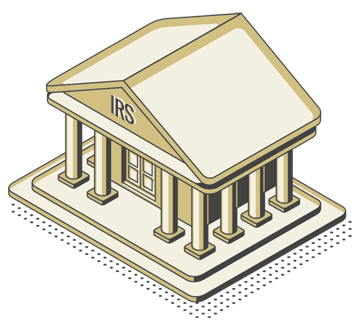
Regarding self-directed gold IRAs, many investors are surprised to learn that “alternative investments” such as precious metals, real estate, and now even cryptocurrency are allowed in individual retirement accounts (IRAs) – however just because they're allowed it doesn't necessarily mean you should add them!
While the Internal Revenue Service (IRS) does prohibit some investments (life insurance, collectibles), the limits of many investment types were due to the requirement that IRA trustees be a “bank, financial institution, or regulated trust company.”
The banks and brokerage houses that functioned as trustees specialized in stocks, bonds, and mutual funds and had little incentive to expand investment choices.
Self-Directed IRAs

In 2008, the IRS approved “non-bank custodial accounts,” allowing the purchase and ownership of alternative investments like gold. Few taxpayers have converted their IRAs to new self-directed plans despite the advantages. In 2016, The US Government Accountability Office (GAO) noted that only about 2% of IRAs are invested in alternative investments and recommended that the IRS could provide “more specialized information and technical regulations” to improve understanding and compliance.[i]
A self-directed IRA requires an approved custodian or trustee to administer the account just as a traditional or Roth IRA requires. The IRS investigates, sanctions, and regulates non-bank trustees as fiduciaries. Each is subject to the same prohibited investments, including…
- Life insurance. While the IRS does allow annuities, you cannot purchase whole, universal, or variable universal life insurance inside an IRA.
- Financial derivatives. The IRS does not allow any trade or position with unlimited or undefined risk since the account provides financial security during retirement.
- Collectibles or antiques. Furniture, wine, fine art, stamps, precious stones, porcelain and pottery, silver and dinnerware, jewelry, comic books, and baseball cards are among the excluded investments.
- Personal residence. Ownership of any real estate used personally is prohibited.
- Collectible coins. A coin's currency value must be higher than its market value except in specific cases like American Eagles or American Buffaloes to be an eligible IRA investment.
Investment in precious metals requires a trustee familiar with the safe and secure storage of the physical asset.
Advantages of Gold as an Investment

Low-interest rates and extraordinary heights of security markets worry investors that a significant correction is possible. A review of past market cycles suggests that market fundamentals are at historic levels, signaling a possible correction. The ratio of the total market value to America's Gross Domestic Product (GDP) is almost 2 to 1, nearly double what analysis would consider realistic valuations:
Another measure – Price to Earnings Ratio – is well above its average for the last seventy years, illustrating that market values have significantly outpaced earning gains.
Many people consider gold a defensive investment during financial and economic stress. Gold's stability and universal acceptance for more than 5,000 years are unique among assets and currencies. As the table on the right indicates, gold has performed better than the stock market during most market corrections.
Gold is not only a defensive asset since it has a demonstrative record of value gains over a long period compared to traditional market indexes such as Standard & Poor's 500 (S&P 500) or the Dow Jones Industrial Average (DJIA). Compare the number of ounces required to buy a unit of either index over the past twenty years. The figures illustrate that the value of gold has risen at a higher rate than either the S&P 500 or the DJIA.
History is a strong case for including gold in a retirement portfolio for diversification (a defensive strategy in high-risk environments) or asset growth (Increasing value over time).
About Self-Directed Gold IRAs

IRAs' primary benefit to investors is tax savings through tax deferrals. A traditional IRA permits an individual to deduct contributions up to $6,000 in a traditional IRA ($7,000 for a person over 50) from gross income, thereby reducing taxable income and taxes paid. The invested contributions grow tax-deferred until distributed during retirement. Presumably, the recipient's tax bracket will be lower when they are no longer working.
A Roth IRA has the same contribution limits ($6,000 and $7,000 for those 50 and older). While the contribution is not deductible for income tax purposes, subsequent investment growth from investments is tax-free after retirement age. (Note: In each case, deductions and distributions might be limited currently or in the future due to income limits imposed by the US Congress.)
There are specific requirements to own gold in an IRA in addition to contribution limits:
- The gold must be purchased and maintained in the IRA account by the trustee/custodian for cash, even though directed by the account owner. The designated trustee/custodian must always retain the gold. Previously purchased gold by the account holder cannot be transferred to the account. Any gold delivered to the account holder will be deemed a distribution by the IRS and taxed. If the distribution occurs before the account owner's legal retirement age, the account holder may be subject to a penalty of 10% in addition to income taxes.
- The gold must have a purity content or fineness of .995 (99.5%) in the form of bullion or coins allowed explicitly by IRS regulations.
Creating & Maintaining Self-Directed Gold IRAs
Setting up a Gold IRA shouldn't be difficult, expensive, or time-consuming. America's top gold ira companies reviewed on this website are ready to help you complete the forms and guide you through the following steps online:
-
Select the Type of Gold for the Account. The permitted investments in your IRA are either bullion in the form of bars or rounds or specific minted coins of 99.5% purity. Allowable coins include one, one-half, one-quarter, and one-tenth-ounce gold coins minted by different countries. Your chosen precious metals specialist can help you select the most suitable approved gold type for you.
-
Determine Funding Source. The funds for your gold IRA may be the result of a rollover (transfer) from an existing 401(k), 401(a), 403(b), 457, Thrift Savings Plan (TSP), or an annuity. Many people elect to open and fund a new IRA. There is no limit on the number of IRAs an individual might have. However, the total contribution to all must be no more than the maximum allowed by law (up to $6,000 in a traditional IRA or $7,000 for a person over 50). Your chosen precious metals specialist will explain the various options so that you select the one most appropriate for your retirement.
-
Select Qualified Trustee/Custodian. Per IRS regulations, an approved, qualified custodian must hold the assets in an IRA for the benefit of the account owner. While your selected trustee/custodian must be familiar with the purchase and storage of gold investments, they do not provide investment advice. Trustee/custodians charge annual fees for their storage, insurance, and administration services, a consideration when choosing the custodian best suited to your requirements.
-
Fund the Gold IRA. By law, the trustee/custodian must purchase gold investments in your IRA to maintain its tax advantages. The funds may be deposited through a rollover from an existing retirement account or directly by the account owner. There are specific rollover conditions to be followed to avoid a taxable event. Your precious metals specialist will be available to guide you through the process and avoid potential difficulties.
-
Purchase the Selected Gold Type. After funding the account, the account owner directs the trustee/custodian to purchase the gold from a designated dealer. The dealer then directly delivers the gold in the specified form to the trustee/custodian for storage.

Final Thoughts
Self-directed Gold IRAs offer the same tax advantages as traditional or Roth IRAs, plus the opportunity to invest in an expanded group of investment vehicles.
Selecting the right partners to acquire physical gold is critical since many retirement planners recommend gold stocks and gold-related exchange-traded funds (ETFs) as a suitable substitute. In each case, an investor assumes the systemic risk of securities volatility.